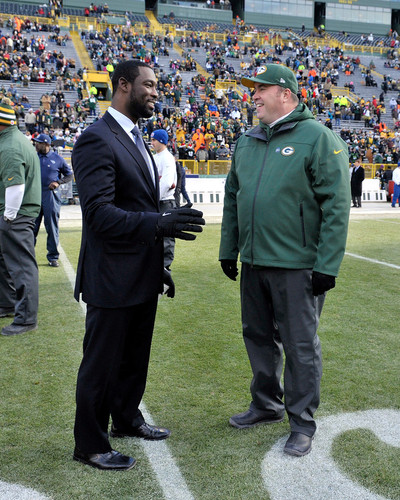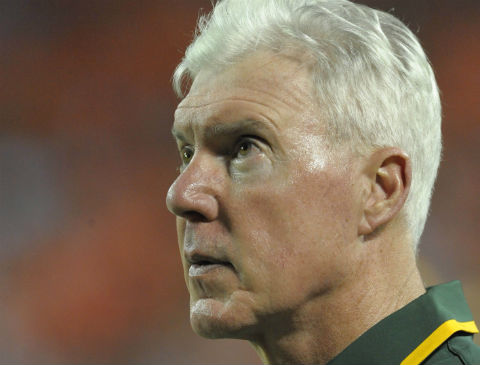After landing interviews with the Washington Redskins and the Seattle Seahawks, I ended up taking the Seattle job in the summer of 2001. I was asked about a particular player who was a receiver. A lot of times, if you’re evaluating someone who played your position, you tend to be harder on him. And I crushed that receiver in my evaluation in terms of his catching and route running. Lo and behold, this receiver was a guy whom they’d just drafted in April – They liked this guy! So I left that interview thinking that I’d bombed. What I learned years later is that they liked the fact that I gave my opinion in terms of what I felt and there was no gray. I was black-or-white in my opinion of that particular player.
It was an entry level job: I was like the assistant to the assistant. I had to earn my keep. I was working out of a closet of an office – and sharing it with one of the quality control coaches. That’s where I met Mike Holmgren, who was the head coach and acting general manager, and Ted Thompson, who was the vice president of football operations. Mike Holmgren didn’t like a lot of barriers. He opened the door for you to learn. He’d tell Ted and I to go up to the coaches meetings and just sit and listen to their perspective. A lot of times, people don’t necessarily open that door. But you need that to have a chance to learn. So I did just that – I was like a fly on the wall. As a receiver, I hadn’t paid a lot of attention to many of the other positions. So I had a lot to learn – and I still have a lot to learn. Coach Holmgren provided that opportunity because he felt it was important to learn the craft and spend some time around all the different departments to see how the whole football operation comes together.
Ted [Thompson] was also instrumental in my growth. He was the kind of person who didn’t say a whole lot. When he did, you certainly paid attention. When I wrote reports, he’d fill them with nothing but red ink. ‘What are you trying to say here? This isn’t painting the right picture. I don’t understand where you are going with this.’ It felt like another English 101 class. It was good though because it helped me understand how to scout, along with the patience and detail involved in each position. I’m really indebted to Ted and Mike for the opportunities that they gave me.
During my six years in Seattle, we had four different general managers. That was a lot of shifts and transitions. Obviously, when you have that kind of change, things aren’t going that well. We did go to the playoffs four times in that time. I don’t think it really began to click until a guy named Tod Leiweke [current COO Of the NFL] came into the building and helped unify things for Coach Holmgren. What I learned during that period is how important it is to have things properly aligned from a leadership standpoint at the top and how that can permeate through the building. That’s one reason why we had so much change. There were situations where people in certain leadership positions wouldn’t even talk to one another. It’s hard to get anything done. You’ve probably heard that ‘A house divided will not stand.’ That can be applied to any profession. Your vision has to be on the same page.
We actually went to the Super Bowl in 2005 and we played against the Pittsburgh Steelers. That was a tremendous opportunity for me too. Not only had I learned some of the negative aspects of not being on the same page, but I got to see first-hand what it takes to build a Super Bowl caliber team, both the players and the staff working there. I experienced the joy that you get from winning an NFC Championship. We ended up losing the Super Bowl to the Pittsburgh Steelers. Ironically, Jerome Bettis, my former teammate at Notre Dame, was with Pittsburgh in the twilight of his career. It was cool to look back with him, especially since he was from Detroit.
Over the years, I had been elevated to a pro scout and then to being the assistant director of pro personnel. And that put me into the greater role of management. As I said, you never know when people are watching. Mike Reinfeldt, who was our vice president and salary cap guy in Seattle, got the general manager job with the Tennessee Titans in 2007. He brought me down there with him. I knew Mike just in passing. We worked together every now-and-then during free agency when we would talk about player grades and how they equated to a player’s financial value. He liked my work and he offered me the job of being the director of pro personnel with Tennessee.
So we moved down to Nashville with the promotion. It was a tremendous opportunity! From a career standpoint, it gave me the chance to literally put my imprint on the department because there was no pro infrastructure in place. They had no grading scale or a staff in terms of pro personnel. Say you looked up a player report for a Peyton Manning — if there was a report in the system — it covered whatever they thought about Manning when he came out of college. That was 10 years ago back then. There weren’t any reports on the current roster either. That’s important because you need to know your team. With the free agency and advance scouting work that the pro department does, you can’t go shopping in free agency until you know what you currently have.
So I was able to come in here and sit down with our IT guys to put together our computer and grading systems. I was part of the building process of putting together a new staff and a budget – and that was very beneficial to me in my growth professionally. We’ve had some success here – and we’ve had some things that haven’t gone as well. In my first couple of years here, we had Jeff Fisher as coach and we went to the playoffs twice. During my tenure, I’ve also had some opportunities to move up, going from a director to being a vice president where I was running both our pro and our college scouting departments.
What Mike did, like Coach Holmgren, is open up some doors for me. They give you a chance to either have success or fail. Mike spoon fed me football operations as a whole. I’d played the game, so I could draw on those experiences. And I had worked in-house as a pro scout, but I needed to learn the college side of it and also the salary cap. Through my eight years in Tennessee, Mike did just that. He afforded me the opportunity to learn, each and every time, a little bit more about football operations as a whole.
Getting an MBA had been on my mind for a long time. For me, it had been a long unaccomplished goal that I’d been thinking about since I stopped playing football. For whatever reason, I was always putting it off. I hadn’t stopped learning: I was selected to participate in NFL-sponsored executive education programs at the Stanford and Wharton, where we studied areas like financial reporting, negotiation, strategy branding, and leadership — basically sharpening the business skills you need to run an organization. The idea took off when a former Notre Dame teammate, Tom Carter, enrolled in the Kelley program. Since he was really encouraging and pushing me, I decided to try it with him. I also enrolled because, in my job, I saw how learning more and getting the bigger picture was really helpful. And there were some areas where I didn’t think I was as strong in, even as my responsibilities had increased over time. It was also a situation where pro football is such a volatile industry. I think it’s very important to be balanced and prepared for change.
It was funny because I started the program in the summer of 2014. Little did I know that I would be let go from my job a year later in Tennessee. They had decided to flatten the football operations side of the organization and eliminated my job. That was perfect timing for me in the sense that I would have something to focus on.







Questions about this article? Email us or leave a comment below.